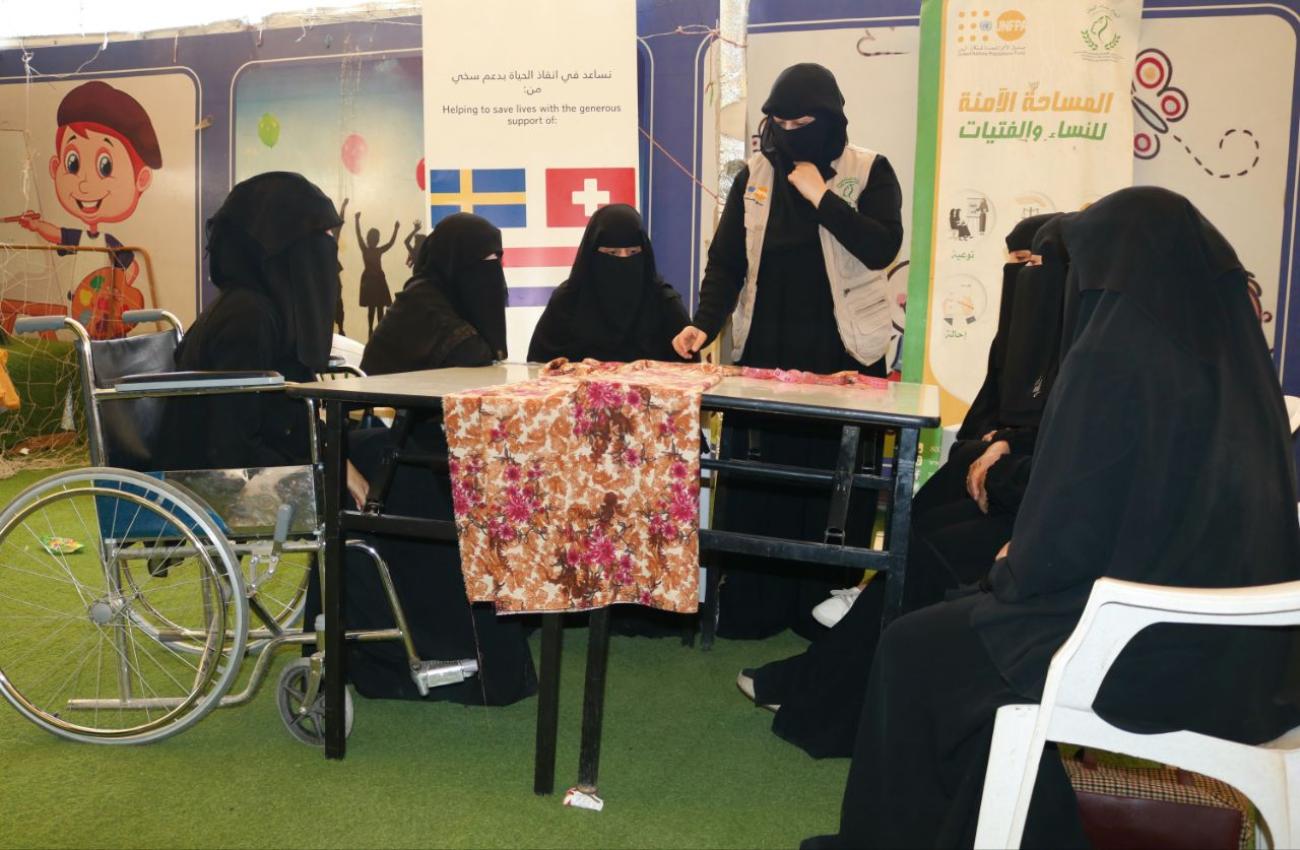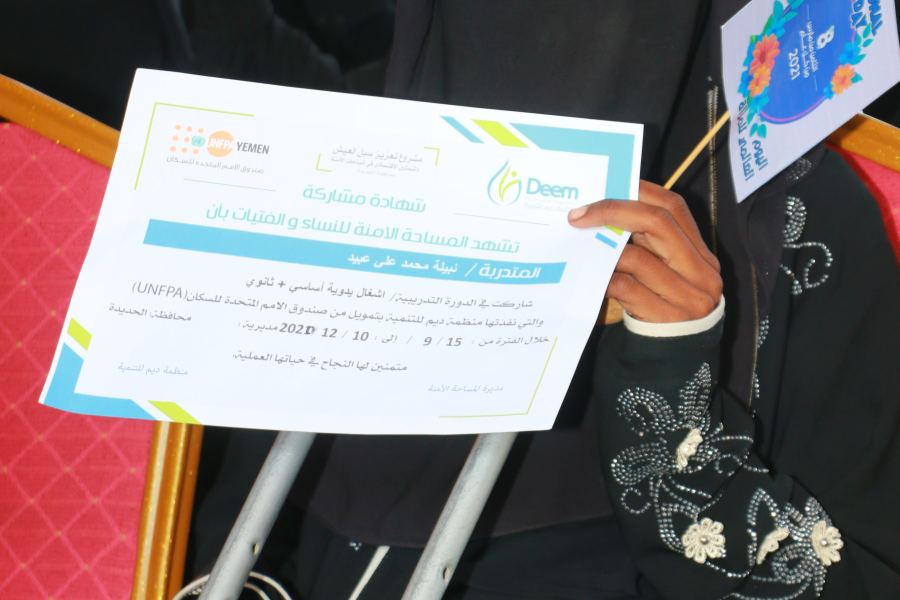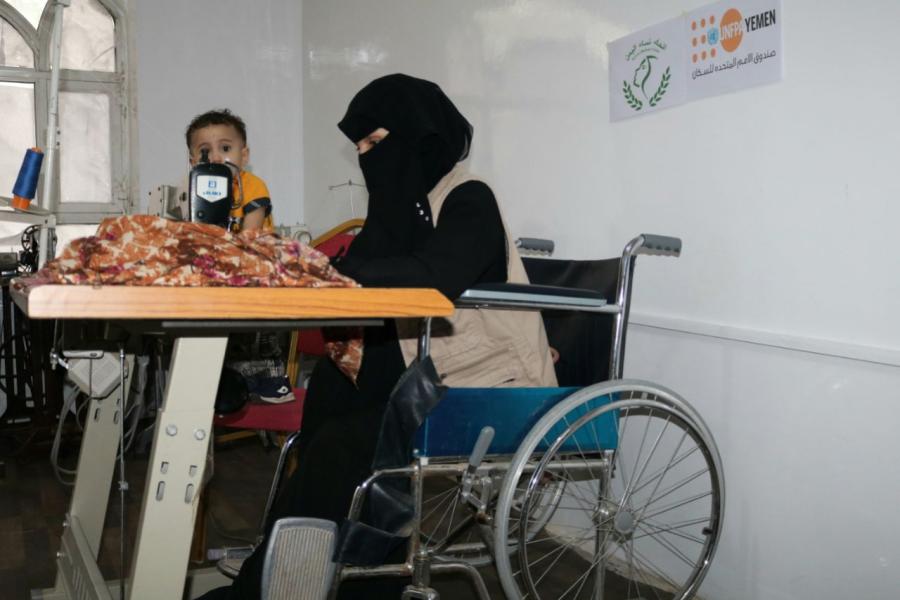UNFPA Yemen - Inclusive safe spaces give Yemeni women with disabilities a chance to be their own breadwinners

AL HUDAYDAH GOVERNORATE, Yemen
For much of her life in western Yemen, Nabila felt the odds were stacked against her. “I was born with a disability in one of my legs. When I was five months old, the wrong needle was injected into the muscle of my good leg – there weren’t enough qualified medical staff at the hospital,” Nabila told UNFPA. She lost her other leg as a result, severely affecting her mobility.
Then her father – the only breadwinner for Nabila’s immediate family of five children and for her stepmother’s family of five more, all under the age of 12 – suffered a serious head injury in a road accident. He could no longer recognize his family members and at times became violent. “Sometimes my father threatens to kill me and my younger brothers if we stay by his side for a long time, so we have to keep away from him,” explained Nabila, now 22.
She wanted to help support the family, but her options were limited as she hadn’t finished school. “Unfortunately, as the conflict erupted my school was destroyed.” she explained.
“I have suffered a lot.”

Conflict, disability and gender discrimination pose steep barriers
From violent conflict and economic collapse to repeated climate disasters and severely disrupted public services, Yemen is grappling with one of the world’s largest humanitarian crises. Some 80 per cent of the population have barely enough food, safe drinking water or accessible health services to survive.
Of the 4.5 million people displaced in Yemen, the vast majority are women and children, and around one quarter of displaced households are headed by women. But gender discrimination is widespread, limiting women’s and girls’ chances to study or earn a living. Meanwhile, the lack of secure housing for those displaced exposes them to protection risks, including sexual violence, exploitation and abuse.
All of these issues are exacerbated for women and girls with disabilities, who face a heightened threat of violence, abuse and discrimination, even as essential health and protection services are either nonexistent or not equipped to accommodate their needs.
Charting their own path
But women and girls with disabilities can survive – and even thrive – when supportive services are inclusive. Nabila learned this firsthand at a safe space for women and girls, run by UNFPA with financial support from the Netherlands, Sweden and Switzerland.
She was initially hesitant to visit, uncertain if she would be accepted. To her surprise, she was not only welcomed, but also offered a wide range of training and support.
She received counselling to build up her confidence and awareness sessions to learn about her rights. She enrolled in a handicrafts course, and after mastering the techniques, began teaching those skills to other girls. She also started selling her products in the local market.
Now her family’s breadwinner, Nabila didn’t stop there. She enrolled in a literacy course at the centre to continue her education, and she helps other girls start their own businesses.
“The safe space helped to change my life – I found out that my disability is not an obstacle to achieving my dreams.”

Successful businesswomen in Sana’a
In Sana’a Governorate, Saba*, now 22, was born with a hearing impairment and received only two years of instruction at a special education centre. The rest of her life was spent in isolation, largely confined to the home. That is, until a neighbourhood sheikh told Saba’s sister about a nearby safe space where women and girls with disabilities were welcome.
“When Saba first arrived at the safe space, she was withdrawn and hesitant,” said Fatima, a volunteer at the UNFPA-supported facility.
Still, Saba enrolled in a two-month vocational training. When she had difficulty understanding the trainer, the programme covered transportation costs so that Saba’s sister could accompany and assist her.
“I couldn't believe the change in her,” her sister said. “She started to smile and greet people… she even started talking to everyone she met.”
“It became my second home. I felt safe and supported there, and I loved spending time with the other women and girls. I learned so much from them, and I felt like I was part of a community,” said Saba.
Nawal*, 25, also attended classes at a safe space in Sana’a Governorate. She lost her sight at age 10, and subsequently only attended school for a single year.
“My father enrolled me in a special needs school, but I had to stop because he couldn’t keep paying for it,” she recalled. The conflict only worsened things. “I used to cry constantly.”
That all changed when she joined the local safe space. “I attended training courses and learned many life skills, such as marketing and project management… Despite my disability, I was learning fast and everyone loves the accessories I make.”
Like Nabila, both Saba and Nawal now run their own small businesses.
Continued support needed
In the first six months of the year, UNFPA reached one million people in Yemen with reproductive health services, protection support and emergency relief. For 2023, urgently needs $70 million to sustain these transformative programmes for women and girls; to date, less than half that amount has been received.
*Names changed for privacy and protection



